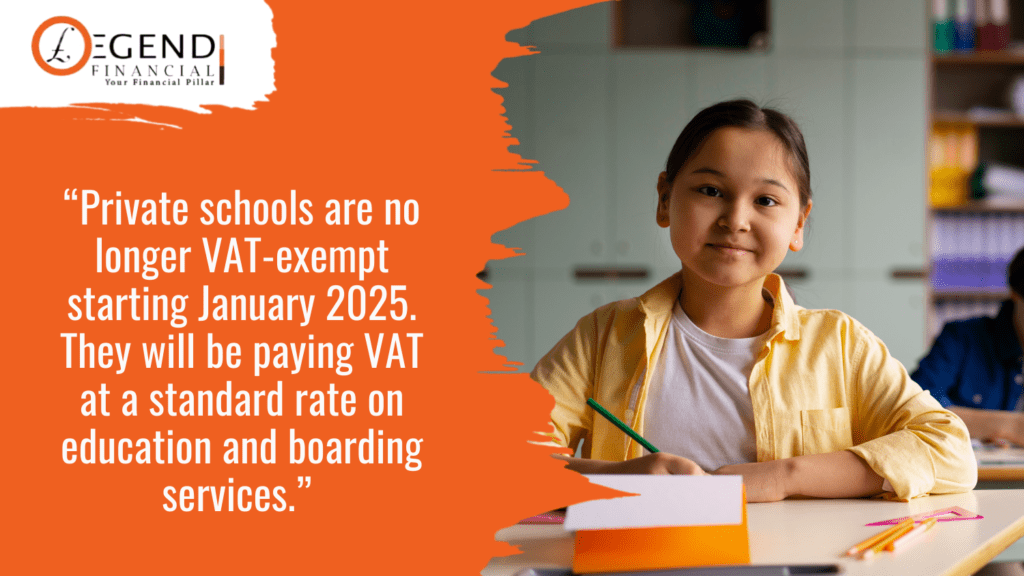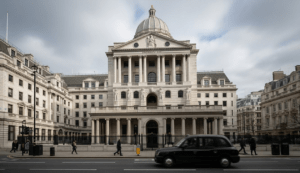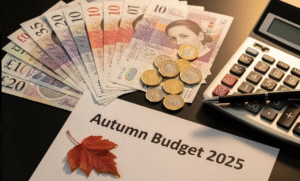Contents
Private schools are no longer exempt from VAT starting January 2025, confirmed in the recent Autumn Budget. This article covers all you need to know about VAT on school fees UK, its implications, and how to prepare for the coming year, whether you are a school stakeholder or a guardian. Read on.
Removal of VAT Exemption for Private Schools
Starting from 1 January 2025, all private schools in the UK will charge the standard VAT on education and related services. This was first announced by Chancellor Rachel Reeves on 29 July 2024 and recently confirmed in the Autumn Budget 2024.
Here are what you need to know about the VAT exemption removal:
- The government aims to use the additional revenue toward funding 6,500 new teachers in state schools.
- It affects approximately 2,500 private schools.
- Half of these schools operate under the Charity Commission. Whilst they are removed from tax breaks, they retain charitable status.
- It does not affect schools under the Department for Education (DfE) or public institutions.
- Parents may experience a significant increase in private school fees UK from 2025 onward.
HMRC (Her Majesty’s Revenue and Customs) will consider any school fee payments, especially advanced payments, from 29 July 2024 and onwards VAT-able. This is part of the UK government’s anti-forestalling measures, aimed at preventing attempts at tax avoidance by making early fee payments when the draft legislation was first announced.
What Else Changed? Besides VAT, private schools will also be removed exemption from charitable business rates relief starting April 2025. Here is a helpful guide for schools and stakeholders: Valuation Office Agency Business Rates Bill & How to Appeal in 2024.
What VAT on School Fees UK Covers
Effective 1 January 2025, the following services will be subject to VAT at the standard 20% rate:
- education fees
- vocational training fees
- lodging and boarding school fees UK
Whilst some educational services and supplies provided by private schools may still be exempt from VAT, the majority of services will now be taxable. See more below.

What the New Policy Does Not Cover
Supplies that are considered ‘closely related’ will remain VAT-exempt, including but are not limited to:
- school meals (e.g., catering)
- transport services for students
- examination fees
- books and stationery, if provided separately from the main educational fees
- educational trips, depending on circumstances and if treated as closely related to education
- nurseries (both standalone and those attached to private schools)
Pro-Tip: Certain grey areas, like the treatment of school trips or the provision of laptops, may require further clarification from HMRC. It is best for schools to seek advice about which exemptions they can claim, as any attempt to artificially split fees to claim more VAT exemptions may be challenged.
Conditions for VAT Reliefs and Partial Exemptions
Some exemptions may be granted fully or partially on a case-by-case basis:
Bursaries or Scholarships
- Bursaries funded by third parties will be individually evaluated to determine if they are grants or payment for services.
- If a bursary is funded by the school itself, the payment is not subject to VAT.
- Half-funded bursaries are still due the full amount of VAT.
- Discounted fee arrangements will incur VAT only on the discounted fee amount.
Special Educational Needs (SEN) Students
- Relief for students with special needs or disabilities will not be administered through VAT exemptions but through other measures, such as local authority refund schemes.
- Parents who pay private school fees for their SEN children will not qualify.
The new VAT legislation does not explicitly exempt faith schools or other specific types of private institutions. SEN schools, however, are generally excluded from the definition of ‘private schools’ for the new VAT legislation.
How the Changes Impact Schools and Parents
The removal of VAT exemptions on private school fees may impact smaller schools operating on tight margins. These schools may face challenges such as potential closures or increased compliance burdens. Private schools raise fees by varying amounts, potentially reducing bursaries and making private education more exclusive.
For parents, the impact will vary depending on the school. Not all schools may raise school fee payment plans by the full 20%, but many will adjust fees upward to cover VAT, adding to the existing cost increases over the years. The UK government, however, estimates a 10% increase in private school fees.
How Schools Can Comply with the New VAT Policy
Schools may face administrative complexities in VAT registration, challenges with partial exemption calculations, or additional burden of compliance, especially with Making Tax Digital. Here are how schools can adapt well to the new VAT rules:
- Schools planning to register from 30 October 2024 must charge VAT once they receive their VAT number, except on education and boarding fees pre-payments until 1 January 2025.
- Schools currently not registered for VAT should wait for HMRC’s further guidance before applying.
- Provide training and support for finance and commercial teams to manage the new VAT requirements effectively.
- Review finance systems to ensure they can track sales and purchases on both net and VAT bases.
- Assess all sources of miscellaneous income and maintain accurate records of capital expenditures.
- Identify potential for VAT recovery on capital expenditure incurred in the past 10 years that was previously non-recoverable.
- Evaluate existing VAT rulings, structures, or special methods, such as those used in catering, to determine if adjustments are needed.
- Be prepared to handle VAT invoicing correctly.
Be Proactive: Appointing a VAT adviser is recommended to navigate the complexities of the new rules and optimise VAT recovery where possible.
Preparation Tips for Parents or Guardians
Schools may adjust fees in various ways, so it is crucial for parents to check with their specific school for detailed fee structures. Some may increase fees by a full 20% or less. To be safe, it is advisable to set aside 20% more for school fees.
Note that pre-payments for future terms might be liable for the VAT increase if the fee structure changed due to anti-forestalling measures. To avoid tax triggers, it is best to avoid paying future term school fees in advance. Parents should discuss with their school’s finance team about potential fee increases to set aside the right amount.
Need to Know: School fees paid before 29 July 2024 for terms starting before 1 January 2025 are not subject to VAT. They follow the rules in force at the time of payment. Generally, fees paid under the old rules are not subject to the new VAT rate.
Other FAQs on the New VAT Rule
This depends on the school. Be sure to ask your respective schools if there will be any fee increases.
State schools may be able to accommodate additional students who may transfer from private schools, as overall student numbers are projected to decrease by 700,000 by 2030.
The government aims to level the playing field between private and state schools while using the additional tax revenue to fund improvements in public education through the new VAT rules.
VAT-registered entities are eligible for reclaiming VAT. The same applies to private schools that are now under VAT rules.
How Legend Financial Can Help You
Whether you are a parent or a school client, Legend Financial and Tax Advisers can help you in many ways with your VAT on school fees UK affairs. If you are a school stakeholder, we help you determine how to treat supplies for VAT purposes, provide advice on necessary accounting software changes according to the new rules, price strategically, and more. Talk to our VAT specialists today!





![What is Council Tax? [2025 Guide]](https://legendfinancial.co.uk/wp-content/uploads/2023/09/LF-Blog-33-CR250210LF-ft-1-300x181.webp)





